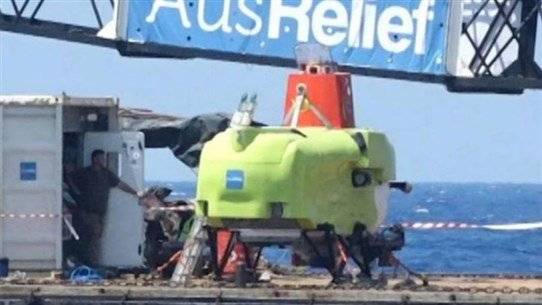After completing all logistical and operational procedures for the submarine to start its search for the "Death Boat," all eyes in Tripoli are focused on the port of Tripoli, which has become the scene of the last few days, and on what potential outcomes this submarine's work may yield. The search mission for the "Death Boat" and the remains of its drowned victims began at 10 AM yesterday from the port of Tripoli, with the participation of MP Ashraf Rifi, the victims' families, and the Lebanese Army, which provided the necessary facilitations for this purpose, along with the submarine's crew and a large team of local and international journalists. The search took more than four hours while the families held their breath awaiting the moment of truth.
The submarine undertook a long journey offshore to determine the location of the sunken vessel, but the weather conditions did not assist in completing the search mission. Shortly after 2 PM, the Lebanese Army announced via Twitter, "The search mission for the sunken boat off the city of Tripoli has been postponed due to rising sea waves that may threaten the submarine and its crew's safety." This announcement was expected due to the intensifying waves and winds that hindered the progress of the submarine and prevented it from descending into the depths of the sea, after it had almost pinpointed the spot where the "Death Boat" may have sunk.
The submarine and its crew, along with everyone accompanying its work on the first day, returned to the port of Tripoli, with plans to reschedule for a later time when the weather conditions would be calmer. This return delayed the anticipated meeting with the truth that families and the city of Tripoli had long awaited. Colonel Haitham Dnawi, the commander of the Lebanese Navy, explained in a press conference from the port of Tripoli the details of the submarine's operation and expected that "work will continue for several days depending on the results found," indicating that "the submarine is 5.68 meters long and 2.24 meters wide, can reach depths of 2,180 meters, and has a crew of three who operate it." He added that the submarine remains in constant communication with its director during dives, is not tethered to the surface, and is sent to carry out its full mission, returning with recordings and observations. "The work is precise, and we need various results to be anticipated," he noted, adding that a special operations room had been established by the naval forces to closely monitor the submarine's mission.
MP Ashraf Rifi expressed hope that the submarine would achieve results, and that they would be able to locate the boat and recover their martyrs, doing what is right for them, for the country, and for the families in Tripoli, a city that has suffered greatly yet remains steadfast in its patriotism. Will the weather and waves allow the submarine to continue its mission? It is certain that the postponement of the search for the boat will leave people’s hearts hanging on the sea waves until the weather calms down, enabling the submarine to pursue the humanitarian mission it was prepared for.
The experience of the first day did not yield the desired result. However, this is certainly not the end. The long maritime journey, during which some journalists fainted due to weather changes, was undertaken with the intention of achieving results and returned with the disappointment of the families at its inability to dive, while some found it difficult to understand the halt in operations because the waves were not severe enough to completely hinder the submarine’s work. This situation prompted a wave of reactions and comments yesterday evening, leading to a division in public opinion in Tripoli, with some considering that the submarine serves merely for imaging and determining the condition of the boat from the bottom of the sea rather than recovering the sunken vessel, while others maintain that the submarine is capable of retrieving the boat and came for that purpose.
Furthermore, there was a split opinion in the city regarding whether the arrival of the submarine should be seen as an achievement for Rifi or as something the state should have accomplished. How can a submarine designed for underwater missions return from its journey due to waves? It is certain that the submarine will be a subject of intense political debate in Tripoli in the coming days until it is able to fulfill the goals for which it was sent. Will this submarine bring a conclusive answer to the families of the victims of the Death Boat, or will it become a new source of division?




